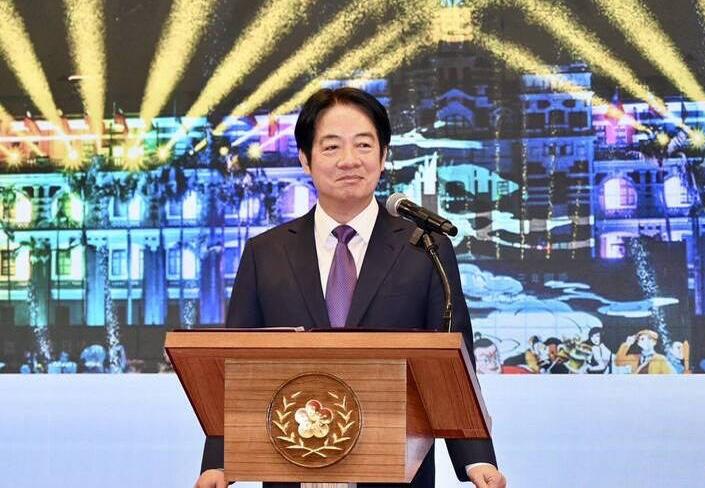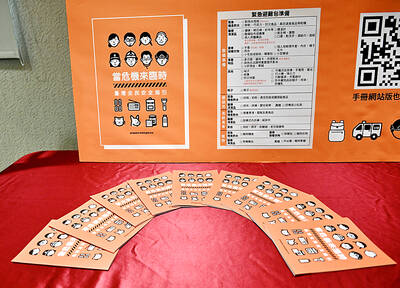President William Lai (賴清德) delivered his New Year’s address this morning at the Presidential Office, focusing on upholding democracy, safeguarding national security and bolstering economic resilience while also touching on political disputes in the legislature.
Regardless of any threats or challenges Taiwan faces, “we must keep firm on the path of democracy,” Lai said.
“Domestic political disputes must be solved democratically,” Lai said regarding recent wrangling between the ruling and opposition parties in the Legislative Yuan.

Photo: Lo Pei-de, Taipei Times
“The Executive Yuan has the right to request a reconsideration of controversial bills passed in the Legislative Yuan,” Lai said.
“Constitutional institutions can also lodge a petition for a constitutional interpretation, and through Constitutional Court adjudication, ensure a separation of powers, safeguard constitutional order and gradually consolidate the constitutional system,” he added.
Lai emphasized that “the people have the right of election, recall and referendum,” as democracy means “sovereignty in the hands of the people.”
He asked that the ruling and opposition parties reconsider amendments to the Act Governing the Allocation of Government Revenues and Expenditures (財政收支劃分法), as the central government needs adequate resources to promote the nation’s well-being.
On national security, Lai said that peace in the Taiwan Strait is essential for global security.
“The more secure Taiwan, the more secure the world. The more resilient Taiwan, the sounder the defense of global democracy,” Lai said.
Taiwan “must continue increasing our national defense budget, bolster our national defense capabilities and show our determination to protect our country,” he said.
The nation must form a “whole-of-society defense resilience” in response to major threats, as well as information and cognitive warfare, he added.
In addition to defense resilience, Taiwan must continue enhancing its economic resilience by diversifying its markets, Lai said.
Taiwan is accomplishing this by increasing investment in the US, Japan, Europe and New Southbound Policy countries, he said.
Taiwan must also “link with democratic countries so that we can together enhance the resilience of supply chains for global democracies,” Lai said.
Lai spoke of working toward a “Balanced Taiwan,” ensuring that the fruits of Taiwan’s economic growth can be enjoyed by all.
“Our nation belongs to all 23 million of us, without regard for ethnic group, generation, political party, or whether we live in urban or rural areas,” Lai said.
Taiwan has endured earthquakes and typhoons, challenges posed by authoritarianism and even won the Premier12 baseball championship, Lai said, reflecting on the previous year.
Lai spoke of Taiwan’s gold medal wins at the Paris Olympics and the International Junior Science Olympiad, emphasizing that through all the ups and downs, “we are all members of Team Taiwan.”

One of two tropical depressions that formed off Taiwan yesterday morning could turn into a moderate typhoon by the weekend, the Central Weather Administration (CWA) said yesterday. Tropical Depression No. 21 formed at 8am about 1,850km off the southeast coast, CWA forecaster Lee Meng-hsuan (李孟軒) said. The weather system is expected to move northwest as it builds momentum, possibly intensifying this weekend into a typhoon, which would be called Mitag, Lee said. The radius of the storm is expected to reach almost 200km, she said. It is forecast to approach the southeast of Taiwan on Monday next week and pass through the Bashi Channel

NO CHANGE: The TRA makes clear that the US does not consider the status of Taiwan to have been determined by WWII-era documents, a former AIT deputy director said The American Institute in Taiwan’s (AIT) comments that World War-II era documents do not determine Taiwan’s political status accurately conveyed the US’ stance, the US Department of State said. An AIT spokesperson on Saturday said that a Chinese official mischaracterized World War II-era documents as stating that Taiwan was ceded to the China. The remarks from the US’ de facto embassy in Taiwan drew criticism from the Ma Ying-jeou Foundation, whose director said the comments put Taiwan in danger. The Chinese-language United Daily News yesterday reported that a US State Department spokesperson confirmed the AIT’s position. They added that the US would continue to

The number of Chinese spouses applying for dependent residency as well as long-term residency in Taiwan has decreased, the Mainland Affairs Council said yesterday, adding that the reduction of Chinese spouses staying or living in Taiwan is only one facet reflecting the general decrease in the number of people willing to get married in Taiwan. The number of Chinese spouses applying for dependent residency last year was 7,123, down by 2,931, or 29.15 percent, from the previous year. The same census showed that the number of Chinese spouses applying for long-term residency and receiving approval last year stood at 2,973, down 1,520,

EASING ANXIETY: The new guide includes a section encouraging people to discuss the threat of war with their children and teach them how to recognize disinformation The Ministry of National Defense’s All-Out Defense Mobilization Agency yesterday released its updated civil defense handbook, which defines the types of potential military aggression by an “enemy state” and self-protection tips in such scenarios. The agency has released three editions of the handbook since 2022, covering information from the preparation of go-bags to survival tips during natural disasters and war. Compared with the previous edition, released in 2023, the latest version has a clearer focus on wartime scenarios. It includes a section outlining six types of potential military threats Taiwan could face, including destruction of critical infrastructure and most undersea cables, resulting in